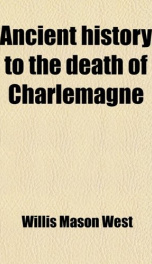ancient history to the death of charlemagne

Purchase of this book includes free trial access to www.million-books.com where you can read more than a million books for free. This is an OCR edition with typos. Excerpt from book: ANCIENT HISTORY. INTRODUCTION. I. WHAT HISTORY SHALL WE STUDY? The whole series of human generations should be regarded as one man, ever living and ever learning. Pascal. Through the ages one increasing purpose runs, And the thoughts of men are widened with the process of the suns. Tennyson. 1. Prehistoric Life excluded. The first steps toward civilization must have been uncertain and slow. No doubt these beginnings took long periods of time, but we can know little about them, for no people leaves records that the historian can use until it has advanced a long way from primitive savagery. To be sure, there are tribes still in primitive stages; and, by comparing them with what can be gleaned from traditions, customs, words, and early records of our own civilization, scholars have learned something of how our forefathers must have lived before Homer and before the oldest inscriptions upon Egyptian stone. But this study of early cultures, fascinating though it be, is not properly history. History is based always upon records, and these older stages in human life we call prehistoric. Still, it is well for us to remember that our imposing and varied civilization rests upon this unrecorded work of prehistoric man through slow, uncounted ages. The development of language; the invention of the bow. of making fire, of potteryto stand the fire; the domestication of the dog and cow; the learning to live together, not in droves, but in families and tribes; the rude beginnings of agriculture; the smelting of metals to replace stone tools; these are steps any of which are infinitely more important than the discovery of electricity or the growth of federal government: but all this, and much Three Staobs In F1re-makino. more, had become the common property of man...
Info about the book
Author:
Series:
Unknown
ISBN:
0548008272
Rating:
3/5 (2)Your rating:
0/5
Languge:
English
Users who have this book
Users who want this book
What readers are saying
What do you think? Write your own comment on this book!
write a commentGenre
if you like ancient history to the death of charlemagne try:
Do you want to read a book that interests you? It’s EASY!
Create an account and send a request for reading to other users on the Webpage of the book!



